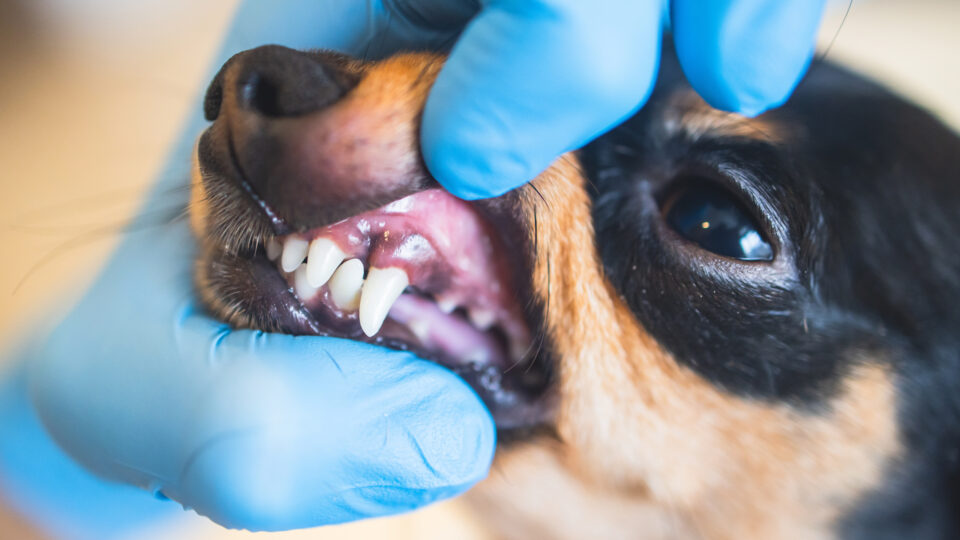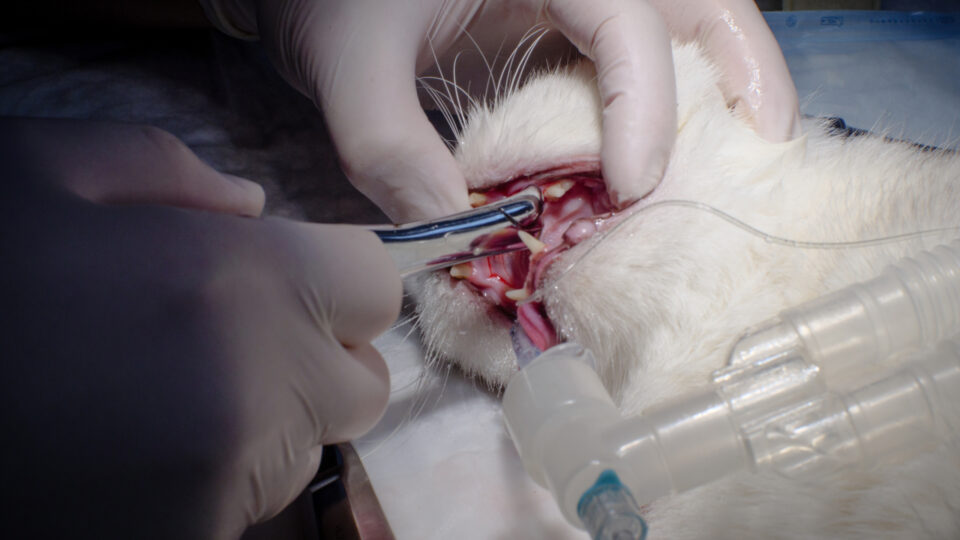Pet Dentistry at Amherst Veterinary Hospital

Maintaining your pet’s dental health is as imporant as caring for their daily needs of food and exercise. At Amherst Veterinary Hospital, we offer comprehensive dental services to ensure they keep their gums and teeth healthy. Our dedicated team is committed to providing the best pet dentistry services with a gentle and compassionate approach.
Our Dentistry Services
Quality pet dental care is at the core of what we do here at Amherst Veterinary Hospital. Our range of dental services for pets includes:
Dog and Cat Dental Cleaning
Preventative care is key when it comes to oral health. Our routine cleanings keep your pet’s mouth in good condition and help spot any early signs of dental issues.
Digital Dental Radiography (X-Rays)
Our digital radiography tools allow us to view beneath the gum line where most dental disease is found, helping us diagnose issues that are not visible simply by looking inside your pet’s mouth.
Basic Oral Surgeries
We perform standard extractions and other surgical procedures to address and treat various dental problems.
Specialist Referrals
For more complex needs, such as root canals, tooth caps, or orthodontics, we guide you through the process and refer you to specialized professionals in the field.
Benefits of Regular Dental Care
When it comes to your pet’s dental health, regular care can provide numerous benefits, including:
Preventing Periodontal Disease
Routine cleanings and check-ups help thwart the progression of periodontal disease.
Fresher Breath
Kiss goodbye to bad breath as good dental care keeps those mouth odors in check.
Reduced Health Risks
Looking after your pet’s mouth can mean fewer complications later on, safeguarding the heart, liver, and kidneys from bacterial infections.
Avoiding Discomfort
Dental diseases can cause significant pain. With regular dental care, we aim to prevent the causes of dental pain for a happier pet.
Increased Longevity
Dental health has a direct impact on overall well-being. Dental care can lead to a longer, healthier life for your pet.
Early Detection
Frequent dental exams help us catch problems at an early stage when treatment is often simpler and more cost-effective.
Better Chewing and Digestion
A healthy set of teeth means better nutrition and better digestion for your pet.

Does My Pet Have Dental Issues?
Just like humans, pets can experience a range of dental issues that, if left untreated, can lead to more severe health complications. Monitoring your pet’s oral health can be challenging, as they can’t verbally express discomfort or pain. However, there are several indicators that can help you determine if your beloved companion might be suffering from dental issues.
Bad Breath
Excessively foul breath can be a sign of periodontal disease or tooth decay.
Swollen or Inflamed Gums
Swollen gums can signal gingivitis or the presence of an infection.
Loss of Appetite or Difficulty Eating
If your pet seems reluctant to eat, chews on one side of their mouth, or has suddenly lost their appetite, it could indicate oral discomfort or dental problems.
Visible Tartar Buildup
A buildup of plaque or tartar on the teeth, especially near the gumline, is a common sign of dental issues.
Bleeding Gums
Any sign of blood on their toys or in their water bowl might suggest gum disease or gingivitis.
Loose or Missing Teeth
Advanced dental disease may result in teeth becoming loose or even falling out over time.
Pawing at the Mouth
Frequent pawing or rubbing at the face and mouth area can be a sign of dental discomfort.
Changes in Behavior
Any changes in behavior, such as increased aggression or depression, can be a result of the pain or discomfort caused by dental issues.
Discolored Teeth
Yellow or brown tartar buildup on the teeth is an indication of poor dental health.
Excessive Drooling
While some pets naturally drool more than others, an increase in drooling, especially if it’s tinged with blood, can indicate oral health problems.
For more information about digital radiographs, or to schedule an appointment for your furry friend, please contact Amherst Veterinary Hospital. We are dedicated to offering informative, authoritative, and concise veterinary care because the health and happiness of your pet are what matters most to us.
Frequently Asked Questions
Frequently Asked Questions About Dental Health and Dental Cleanings
How can I maintain my pet’s dental health at home?
Regular brushing of your pet’s teeth, offering dental-specific diets and chew toys, and avoiding hard objects that can cause tooth damage are all effective strategies. We can also provide specific recommendations based on your pet’s needs during your visit. Our online store offers a multitude of dental products including toothpaste, chews and even specialty diets to help keep your pet’s teeth clean and healthy.
Is anesthesia safe for my pet during dental procedures?
Safety is our top priority. We conduct a thorough pre-anesthetic evaluation including a physical exam and, if necessary, blood tests to ensure your pet is a good candidate for anesthesia. Modern anesthetic techniques and monitoring equipment make the risk minimal.
What exactly happens during a dental cleaning?
A dental cleaning involves removing plaque and tartar from above and below the gumline, polishing teeth to smooth the enamel surfaces, and assessing for any signs of dental disease or broken teeth that may require further treatment.
Can dental problems lead to other health issues for my pet?
Yes, poor dental health can lead to significant systemic issues, including heart, liver, and kidney disease, due to the spread of bacteria from the mouth to other parts of the body.
What are the signs of dental problems in pets?
Key indicators to watch for include foul breath, problems with chewing, drooling, red or swollen gums, and loose or missing teeth. If you notice any of these symptoms, it’s time to schedule a visit.
How often should my pet have a professional dental cleaning?
Our team will assess your pet’s specific needs and recommend a treatment plan that works best for them. Generally speaking, we recommend professional dental cleanings yearly.
How often should my pet have a dental exam?
Typically, we will examine your pet’s mouth during their annual wellness visit. However, if your pet shows any signs of dental issues, such as bad breath or visible tartar buildup, we recommend bringing them in for an exam as soon as possible.